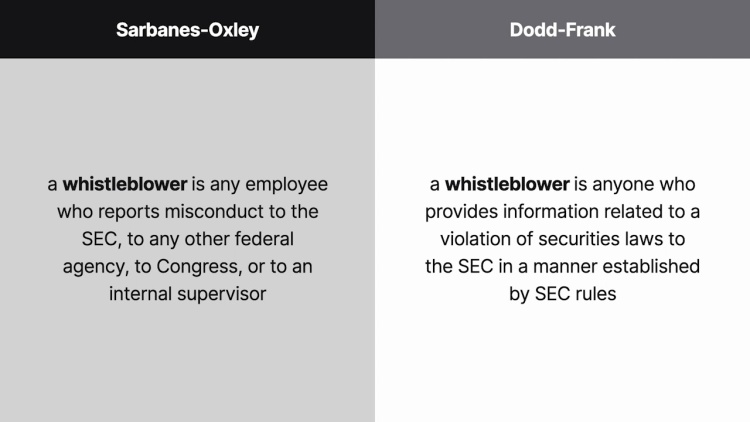Digital Realty Trust, Inc. v. Somers
United States Supreme Court
138 S.Ct. 767, 583 U.S. 149 (2018)

- Written by Sean Carroll, JD
Facts
The Sarbanes-Oxley Act of 2002 (the act) provided that a whistleblower would be protected from retaliation if he provided information relating to criminal fraud statutes, Securities and Exchange Commission (SEC) rules, or “any provision of Federal law relating to fraud against shareholders.” The 2010 Dodd-Frank Wall Street Reform and Consumer Protection Act (Dodd-Frank) also included anti-retaliatory protections for whistleblowers. However, Dodd-Frank defined whistleblower more narrowly, as “any individual who provides . . . information relating to a violation of the securities laws to the [SEC].” Under SEC implementing rules, a whistleblower was entitled to antiretaliation protections if he reasonably believed the information provided related to a violation of securities laws. The rules protected a whistleblower in three situations. The third of which, relevant here, protected whistleblowers from disclosures required or protected under the act or other laws. Paul Somers (plaintiff) worked for Digital Realty Trust, Inc. (defendant). Somers sued Digital Realty in the United District Court for the Northern District of California under Dodd-Frank’s whistleblower provision. Somers alleged that Digital Realty fired him after he informed management that he believed the company was violating securities laws. Digital Realty filed a motion to dismiss, arguing that because Somers did not provide information to the SEC, he did not qualify as a whistleblower under Dodd-Frank. The district court denied the motion, finding Dodd-Frank to be ambiguous regarding the definition of whistleblower. The United States Court of Appeals for the Ninth Circuit affirmed, finding that the SEC was entitled to Chevron deference regarding its rule protecting whistleblowers from disclosures required or protected under the act or other laws. The United States Supreme Court granted certiorari.
Rule of Law
Issue
Holding and Reasoning (Ginsburg, J.)
What to do next…
Here's why 907,000 law students have relied on our case briefs:
- Written by law professors and practitioners, not other law students. 47,100 briefs, keyed to 996 casebooks. Top-notch customer support.
- The right amount of information, includes the facts, issues, rule of law, holding and reasoning, and any concurrences and dissents.
- Access in your classes, works on your mobile and tablet. Massive library of related video lessons and high quality multiple-choice questions.
- Easy to use, uniform format for every case brief. Written in plain English, not in legalese. Our briefs summarize and simplify; they don’t just repeat the court’s language.





